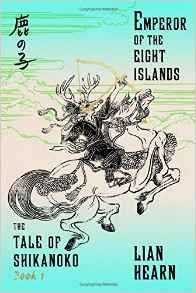Eugen M. Bacon Reviews Captive: New Short Fiction from Africa edited by Helen Moffett & Rachel Zadok
 Captive: New Short Fiction from Africa, Helen Moffett & Rachel Zadok, eds.(Catalyst Press 978-1-94639-594-8, $19.99, 453pp, tp) May 2024. Cover by Megan Ross.
Captive: New Short Fiction from Africa, Helen Moffett & Rachel Zadok, eds.(Catalyst Press 978-1-94639-594-8, $19.99, 453pp, tp) May 2024. Cover by Megan Ross.
It’s refreshing to see a robust anthology of African talent featuring eleven writers from nine countries: Eswatini, Guinea-Bissau, Ghana, Kenya, Malawi, Nigeria, South Africa, Uganda, and Zambia. Captive: New Short Fiction from Africa is an initiative of Short Story Day Africa that celebrates the diversity of African voices, and is unusual in its recurrent medley of authors in each of the three parts that make up the book. Each author is showcased with stories across distinct themes of “claustrophobia & inescapable obsessions,” “metamorphosis, cycles and identity,” and “self-awareness, illusion, delusion and deception.”
For a book this large, at over 450 pages, Captive: New Short Fiction from Africa is fascinating from the onset. It embodies “passion and apathy, creation and destruction, honesty and deception” and the “blurred lines between these powerful forces,” as its promotional text suggests. It explores in startling, refreshing, and equally alarming ways identities, connections, obsessions, and delusions.
Part One: Claustrophobia & Inescapable Obsessions opens with Salma Yusuf’s “If the Honey is Sweet, Why Does the Bee Sting?”, a first-person story that begins in a Mombasa golf club as the setting of palm trees, ocean waves, ferries, crabs and seashells is witness to a breaking marriage: “The night folded the moon like a bedsheet. It ate the remnants of the love left behind.”
Sola Njoku’s “The Sting” is an immersive “you-narrative” told in the second-person that addresses the protagonist in a story on themes of marital disconnection and deception with a dire non-ending, as the torment is enduring. Aba Asibon’s “Wednesday’s Delight” is a moving third-person tale of a man who learns in a phone call of an 18-year-old daughter he’s yet to meet, and the discovery evolves into Wednesday sojourns to heal familial loss. Kabubu Mutua’s “On Chancellor’s Street” is woven in seasons, flowers, and trees as they thrive or die to traverse, with poignancy, the deep impacts of longing, political upheaval and forbidden love. Emily Pensulo’s first-person story, “In Madam’s House”, is a dreamscape of more yearning of a borrowed life that’s an escape. Doreen Anyango’s “Manifesting” addresses in vivid language the mundanity of marriage and the hurt of infidelity: “The sun is at its most furious when I leave the house.”
In “The Third Commandment”, speculative fiction by Khumbo Mhone, a stranger arrives three days before Upile is to die in a patriarchal dystopian world where daughters are unwelcome, and mothers have a burden to bear sons or face societal disconnection. Moso Sematlane’s “The Day the City Wept” has its sentients and programs and a time before “The Great Migration” where programmed bodies that have lost humanity now and then wistfully find recollection of it. N.A. Dawn’s “Girl’s Best Friend” inhabits a child’s fears of those closest to her and the welcome of a floating sentinel that appoints itself as her ward. Josephine Sokan’s “Good Things Come” unveils in first person where maternal longing and societal expectation lead to theft, where a woman who will do anything to assuage her need. Another first-person story entombs the need to belong with a broken homecoming in Zanta Nkumane’s “Heaven’s Mouth”.
These stories whet the reader’s appetite for Part Two: Metamorphosis, Cycles and Identity, then Part Three: Self-Awareness, Illusion, Delusion and Deception in a randomized story cycle of sorts. The reader encounters Afrocentric character names, such as Kasimba, Rabeka, Saada, Swafiya, Zeinab, Haseena, Upile, and Aunty Boi Boi, which makes the book feel both familiar and different to African and non-African readers respectively.
Worthy mentions include Kabubu Mutua’s “Vanishing”, in which a bride absconds on her wedding day with jewelry and her dowry in a casket; and Zanta Nkumane’s queer detective narrative “Sometimes You Make Me Smile”, with its sinister opening:
The body hangs over the toilet bowl as if in prayer. Its arms flop to the floor like vines overdue for a pruning. The overflowing water buoys the man’s head and gushes over and across the large office bathroom floor towards the door, as if running away from the dead body.
Unfolding in parallel narratives, Detective Mila must solve the mystery of a serial killer with unusual methods. Salma Yusuf’s “Prayer Times” is a lengthy poem of disloyalty and self-acceptance in today’s infiltrating social media. Look out for Zanta Nkumani’s “Mvelicanti’s Gift”, Doreen Anyango’s “Nankya’s Ghost” and Aba Asiban’s “Akua’ba”.
When you read an intelligent story that makes you reflect on the playfulness of its text and the ominous way in which the narrative unfolds, you know that you’re onto a good thing. This is how most stories in Captive: New Short Fiction from Africa made me feel, especially when they left me contemplating them with fondness and dread. The calibre of stories is unsurprising given the authors involved, and the scholarly/editorial skills of editors Helen Moffett and Rachel Zadok.
I am a writer who’s also an editor. I would have preferred to see the authors from diverse backgrounds contextualize their non-English text and make their stories more accessible to a broader readership. This is a contentious topic, but I am an African who did not understand some African text. With my Tanzanian origin, I felt at home with Swahili words like dukas, mbuzi, kajaanja, mikate ya nazi, si riziki yangu, kaimati, baraza, kikulacho kinguoni mwako, but was unfulfilled by terminology such as kaveera, brikicho or khonde, and yearned to know what the Basotho warriors were singing when they chanted, in Moso Sematlane’s “The River’:
Ke nna Cucutle
Masole a feta a bina!
Sefela sa ntoa se nfetile!
Se nfitile, se nyatsa kholiso e aka!
Se kokota monako oa Bonkuku!
Ke nna sesole le lefifi!
Captive is an unusual medley of phenomenal stories that are not all speculative but showcase darn good storytelling layered with texture, specificity, and the authenticity of a personal touch. This anthology offers Afrocentric fiction, stories beautifully canvassed and etched out with the finest strokes that sometimes coat stories within stories.
Eugen M. Bacon, MA, MSc, PhD, is African Australian, a computer graduate mentally re-engineered into creative writing. She studied at Maritime Campus, less than two minutes’ walk from The Royal Observatory of the Greenwich Meridian. She’s a 2022 World Fantasy Award finalist, and was announced in the honor list of the 2022 Otherwise Fellowships for ‘doing exciting work in gender and speculative fiction’. Her book Danged Black Thing made the 2021 Otherwise Honor List as ‘a sharp collection of Afro-Surrealist work’. Eugen has won or been commended in international awards, including the Foreword Indies Awards, BSFA Awards, Bridport Prize, Copyright Agency Prize, Horror Writers Association Diversity Grant, Otherwise, Rhysling, Elgin, Aurealis, Australian Shadows, Ditmar and Nommo Awards for Speculative Fiction by Africans. Eugen’s creative work has appeared in literary and speculative fiction publications worldwide, including Award Winning Australian Writing, Fantasy Magazine, Fantasy & Science Fiction, and Year’s Best African Speculative Fiction. New releases: Mage of Fools (novel), Chasing Whispers (collection), An Earnest Blackness (essay collection).
This review and more like it in the May 2024 issue of Locus.
 While you are here, please take a moment to support Locus with a one-time or recurring donation. We rely on reader donations to keep the magazine and site going, and would like to keep the site paywall free, but WE NEED YOUR FINANCIAL SUPPORT to continue quality coverage of the science fiction and fantasy field.
While you are here, please take a moment to support Locus with a one-time or recurring donation. We rely on reader donations to keep the magazine and site going, and would like to keep the site paywall free, but WE NEED YOUR FINANCIAL SUPPORT to continue quality coverage of the science fiction and fantasy field.
©Locus Magazine. Copyrighted material may not be republished without permission of LSFF.







